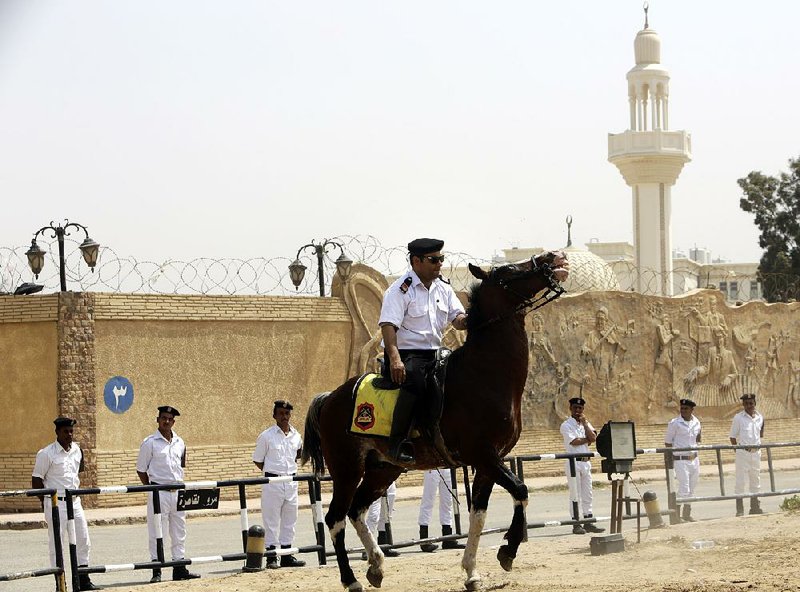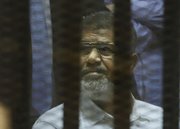CAIRO -- Egypt's ousted Islamist president, Mohammed Morsi, was convicted of using force against protesters and sentenced Tuesday to 20 years in prison in the first verdict against him since he was removed by the military nearly two years ago.
The case was the latest in a series of mass trials on a variety of charges against Morsi and other members of his Muslim Brotherhood, which Egypt's government has branded a terrorist organization and vowed to crush. Amnesty International denounced Morsi's trial as a "sham" -- as rights groups have called many of the trials over the past two years.
The Brotherhood spent decades as an underground organization before vaulting to power after Egypt's 2011 uprising toppled longtime autocrat Hosni Mubarak. The Brotherhood was the biggest winner in subsequent parliamentary elections, and Morsi -- running as its candidate -- became Egypt's first freely elected president in 2012.
A year later, millions protested Morsi's divisive rule, and then-army chief Abdel-Fattah el-Sissi led the military's July 2013 removal of Morsi. As president, el-Sissi has led a fierce crackdown that has shattered the Brotherhood, leading to the deaths of hundreds of its supporters who protested for Morsi's return and to the arrests of thousands more.
Tuesday's verdict sparked no immediate street protests, reflecting the crackdown's effect on any show of dissent.
Most of the Brotherhood's top leaders already have received heavy prison sentences in other trials. Hundreds of death sentences have been handed down for other group members over acts of violence carried out during protests against Morsi's ouster.
The Brotherhood's leader, Mohammed Badie, has received several death sentences in multiple cases -- though they are subject to appeal.
At the same time, Mubarak and members of his inner circle have largely been acquitted of charges related to the killing of protesters during the uprising against his rule. Charges against Mubarak over the killings were dropped earlier this year.
Political science professor Hassan Nafaa said Egyptians have seen the differences between the trials of Morsi and Mubarak.
"People are not reassured of the fairness of these trials," Nafaa said.
The U.S. government also expressed reservations about the Morsi verdict, but State Department spokesman Marie Harf said President Barack Obama's administration would withhold judgment for now.
"We are concerned by these sentences. All Egyptians, regardless of political affiliation, are entitled to equal and fair treatment before the law, including the full respect for their rights to due process," Harf said. "We will review the basis of the verdict, which I understand the Egyptian court will make public soon. I don't think we'll have much more announcements to do before a review of the basis of that verdict."
The government accuses the Brotherhood of fueling violence in the country and has rejected accusations that the judiciary is politicized. The Brotherhood denies any involvement in the violence.
In addition to Tuesday's case, Morsi is facing four other trials in which he could face the death penalty if convicted, on charges including orchestrating a prison break and undermining national security by conspiring with foreign groups.
In Tuesday's verdict, Morsi avoided the death penalty when the judge dropped murder charges. The verdict can be appealed.
The trial was in connection with violence that began during Morsi's presidency in December 2012. Morsi's supporters attacked protesters outside the presidential palace who demanded that Morsi call off a referendum on an Islamist-drafted constitution. In more than 15 hours of clashes, at least 10 people were killed.
The violence fueled public animosity against Morsi, particularly because of images of bearded Islamists swinging clubs, firing rifles and chanting "God is great" as they descended on the protesters' tent camp.
Morsi was convicted on charges of carrying out a "show of force" -- a charge similar to intimidation or thuggery -- as well as illegal detention. The latter charge came because the Islamists who attacked the protesters held some in makeshift prisons at the site and beat them.
In addition to Morsi, 12 Brotherhood leaders and Islamist supporters, including senior figures Mohammed el-Beltagy and Essam el-Erian, were sentenced to 20 years in prison.
The head of Morsi's defense team, Mohammed el-Damaty, said the sentence is "way too much" for a "show of force" charge. He said the judiciary is trying to settle scores because of the numerous political clashes between Morsi and the judiciary during his presidency.
"They are taking revenge now, that is all," el-Damaty said. "Look at the judges' and state prosecutors' narrative and you will see them using terms like 'the deviant group' ... That speaks volumes about prejudices."
A Section on 04/22/2015


